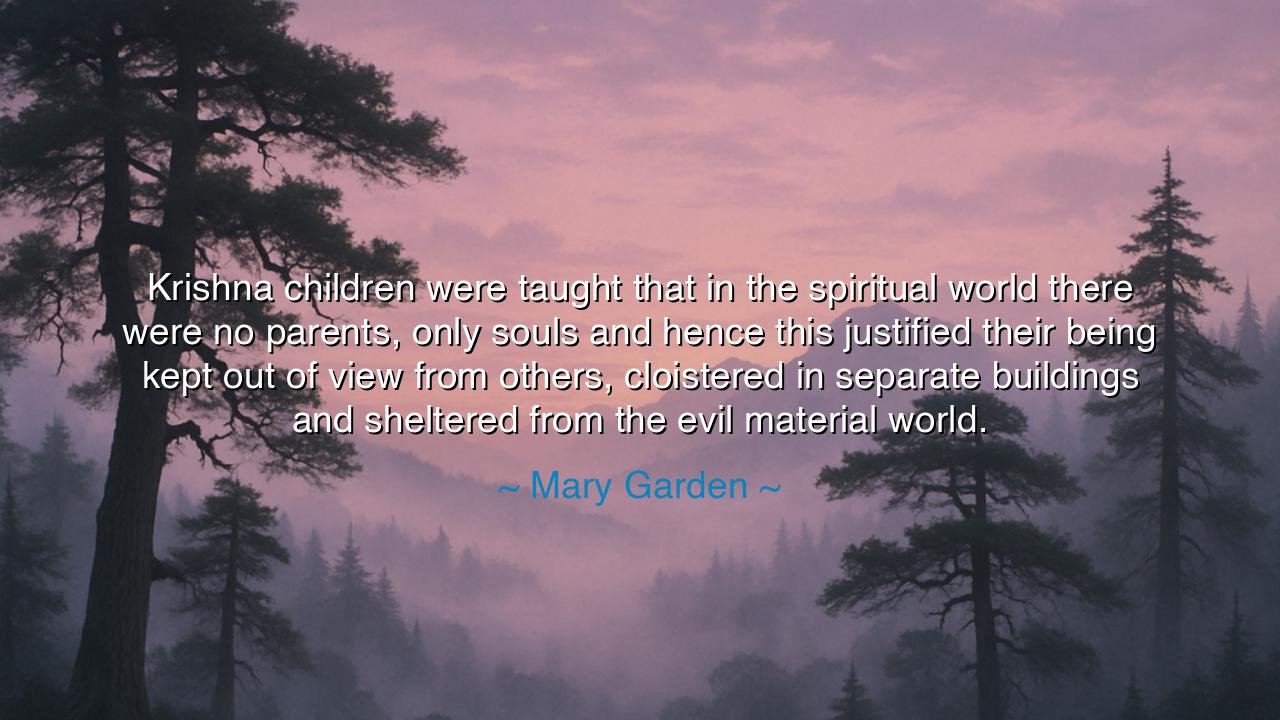
Krishna children were taught that in the spiritual world there
Krishna children were taught that in the spiritual world there were no parents, only souls and hence this justified their being kept out of view from others, cloistered in separate buildings and sheltered from the evil material world.






“Krishna children were taught that in the spiritual world there were no parents, only souls, and hence this justified their being kept out of view from others, cloistered in separate buildings and sheltered from the evil material world.” Thus wrote Mary Garden, the journalist and seeker who, in her investigations of spiritual movements, lifted the veil on one of the most complex truths of human devotion — that the pursuit of the sacred, if twisted by misunderstanding or excess, can become a chain rather than a liberation. Her words are both a chronicle and a warning: that when spiritual ideals are severed from compassion and balance, they can warp into something far from divine.
To understand this quote, one must first know its origin. Mary Garden was a writer who explored new religious movements, including the Hare Krishna movement, which rose to prominence in the West in the mid-20th century. The Krishna faith, rooted in ancient Hindu philosophy, teaches that the soul — the atman — is eternal and part of the divine essence, beyond family ties or worldly attachments. In its pure form, this teaching calls the believer to see all beings as equal, all life as one — a truth both beautiful and freeing. Yet in the application of this belief, Garden saw a distortion: children isolated from their families, separated in the name of spiritual purity, raised apart from the warmth and tenderness that gives earthly life its soul.
Thus, the quote captures a paradox as old as religion itself — the tension between spirit and matter. In many faiths, the material world is seen as a shadow of the eternal, a place of corruption and illusion. But when the rejection of the material becomes total, it begins to deny what is sacred in humanity itself. To say “there are no parents, only souls” may seem lofty, but it can also lead to a forgetting: that even souls, while walking this earth, need love, care, and the gentle bonds of relationship. The child learns of God first through the kindness of a parent’s hand; to sever that bond too soon is to tear the roots of the spirit from the soil of its growth.
History offers many echoes of this same dilemma. In ancient times, the ascetics of the desert fled the cities to seek purity in solitude, believing the world to be filled with sin. Yet some among them, like Saint Anthony the Great, found that isolation could purify only the body, not the heart. True holiness, they learned, must return to the world — to love it, to heal it, to serve it. Similarly, in the East, the Buddha left his palace to escape the illusions of desire, but enlightenment came not from rejection, but from the Middle Way — the path of balance between denial and indulgence. So too, Mary Garden’s observation warns that the denial of the material, when taken to extremes, can turn spirituality into separation, and holiness into harm.
There is also a deeper, more universal lesson within her words. It speaks to the danger of idealism without empathy — of teachings so focused on purity that they forget mercy. The impulse to “shelter from the evil world” is understandable; parents and teachers alike wish to guard the young from harm. But when that protection becomes isolation, it breeds fragility, not strength. The soul, to grow, must walk among the world’s imperfections — for it is in the meeting of light and shadow that wisdom is born. A child who never sees the world cannot learn to redeem it.
Yet Garden’s reflection is not a condemnation of faith, but a plea for humanity within it. The spiritual world may indeed know no parents or possessions, but here, in the realm of flesh and breath, love is our teacher. The family bond, in its purest form, mirrors divine creation itself — it teaches selflessness, sacrifice, and grace. When faith dismisses this, it forgets the divine that dwells in daily life: in the laughter of children, in the labor of hands, in the simple act of care. To honor spirit is not to deny the human, but to sanctify it.
So, my child, take this teaching as both warning and wisdom: seek the sacred, but do not lose sight of the human. Let your faith lift you, but never at the cost of compassion. The soul may be eternal, but while it walks this earth, it must live through love, through touch, through relationship. The spirit that scorns the world becomes proud; the spirit that embraces it becomes whole. Do not hide from the world’s imperfection — be the light within it.
For the divine, after all, does not dwell only in temples or in distant heavens; it lives also in the warmth of a mother’s care, in the guidance of a father’s hand, in the shared journey of souls learning to love one another. That is the truest form of worship — not the cloistered separation of spirit from life, but their union. For in that union, both heaven and earth are made one.






AAdministratorAdministrator
Welcome, honored guests. Please leave a comment, we will respond soon